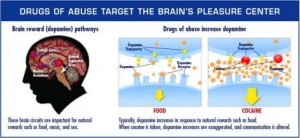The First Step is Education
Q: Should you talk with your boss or employer about possible addiction?
A: Yes, it is possible to explain the effects of drug addiction to your employer, but first you need to understand the way drugs influence and change your brain and behavior. When facing a drug addiction problem you can always rely on professional help from a licensed addiction counselor, a psychologist or a psychiatrist. They can also help you figure out ways to communicate about drug addiction with your boss and navigate through this period in your life.
But, what is addiction really? And how do you open up about it to your employer? We explain more about the nature of addictive behaviors here, and review the basics of talking to your boss, here. After reading this article feel free to post all your questions and personal experiences in the comments section at the end.
What Is Addiction, Really?
Many scientists and addiction researchers have tried to define addiction. According to the National Institute on Drug Addiction (NIDA) addiction is a chronic, relapsing brain disease characterized by a compulsive drug seeking and use, despite harmful consequences. Since it is considered a brain disease, addiction is responsible for changing the brain, its structure and its way of functioning. It alters many processes in the brain such as: thinking and behaving. Therefore the addict simply loses control over the way he/she behaves.
It is essential to remember that the diagnosis of addiction is not a blame-game. Addict’s DO NOT intentionally choose to hurt themselves and those close to them. When drugs take over a person’s mind they completely rule his/her reactions. This means that you do not consciously choose to be irresponsible at work, have a number of sick leaves due to substance use, or act out on your coworkers…but you can expect that such behavior won’t be tolerated for long either.
Here’s a NIDA diagram explaining how drugs work in the brain:

The Reasons Behind Addiction: What Makes You An Addict?
The complexity of addiction is that it cannot be defined as a single cause problem. On the contrary, it is a complex issue due to the multiple factors that are involved in the formation of this disease. Addiction has a genetic, social, and biological/psychological reasons that drive it. The mainf factors that influence addiction include:
- Your individual reaction to specific drugs.
- Your genes.
- The environment in which you grew up.
- The way that you respond to all of the above.
Some people are predisposed to the way certain drugs work in the brain. Other people adapt drug use as a way of self-medicating for past trauma. Still others form a habit when drugs simply make them feel good.
This NIH curriculum outlines the essence of addiction in all cases: the basis of addiction is an uncontrollable, compulsive drug seeking and use, even in the face of negative health and social consequences.
Maybe it’s the pressure you feel at work to meet strict requirements or deadlines that has lead you to drugs in the first place. Sometimes people use psychoactive substances to help them cope with or escape from the dissatisfaction they feel from life and work. In fact, you can expect important questions about your addiction to be explored and answered in your recovery process. The most important thing is that in recovery, you can address such problems and are encouraged to make constructive changes in life.
Read and learn more about addiction before you decide to have the talk with your manager, boss, or human resources person. Many companies may not tolerate drug addiction, but others have an employee addiction treatment assistance program that may help you get your life back together.
Addiction Problems In The Workplace
Communicating about drug addiction with your boss can be difficult. As an employee, you are expected to go through a round of emotions and be torn between the indecision whether to tell the problem straight away, or to keep it a secret and discuss about it with someone else.
Why is this?
The answer is simple – it’s fear!
The most common fear among employees who deal with addiction problems is the fear of losing their job. Regardless of how uncomfortable and embarrassing this may feel you need to be aware of the fact that addiction is a condition with physical and behavioral traces. It is simply impossible to go unnoticed.
If you postpone having the talk with your employer it makes your condition more obvious to the people in your working environment. On the other hand, being honest about your condition is an important step in getting the help you need to get sober and healthy again.
7 Suggestions Before You Open the Conversation
When in doubt about the ways you can discuss addiction with others, seek professional help from a licensed counselor, psychologist or a psychiatrist. They can share some tips about how to present these news to your boss and make the situation less uncomfortable. They will also inform you about all the legal requirements your boss is obligated to respect.
Here are some suggestions which might help your addiction discussion with your employer:
- Inform yourself about addiction and the brain.
- Develop a plan about all the things you want to discuss with your boss regarding your addiction problem.
- Know your rights under Americans with Disabilities Act (ADA). The ADA protects employees who may be recovering drug addicts and alcoholics from discrimination.
- Know your rights under Family and Medical Leave Act (FMLA). All those who qualify for the FMLA are allowed to take 12 work weeks of unpaid, job-protected leave due to specified family or medical reasons within a 12-month period. Among many reasons the FMLA can also be used to receive treatment for drug or alcohol abuse as well.
- Discuss your future treatment plans with your employer openly. Make sure to let your employer know you are aware of your problem and willing to do something about it.
- Find out if your employer offers Employee Assistance Programs (EAP). Some company policies include this type of programs to help employees with personal problems. EAP programs usually include counseling or referrals to high quality rehab facilities.
- Inform yourself your health insurance coverage. Usually health insurance plans offered under the Affordable Care Act’s Health Insurance Marketplace are obligated to cover mental health and substance abuse services. Check what kind of coverage you have.
Most importantly, you should view this conversation as an opportunity to stop lying and hiding. It can be the first brave step towards repairing the many damaged or broken relationships addiction creates. Don’t let fear stop your from getting the help you need. You will be a better worker and once you overcome your drug addiction problem.
Employer Understanding Addiction Questions
If you still have questions about how to explain drug addiction to your employer, we’re here to help. Simply leave your questions and concerns in the comments section below. We’ll do our best to give you a personal answer as soon as we can, or we will refer you to professionals who can help.









Related Posts